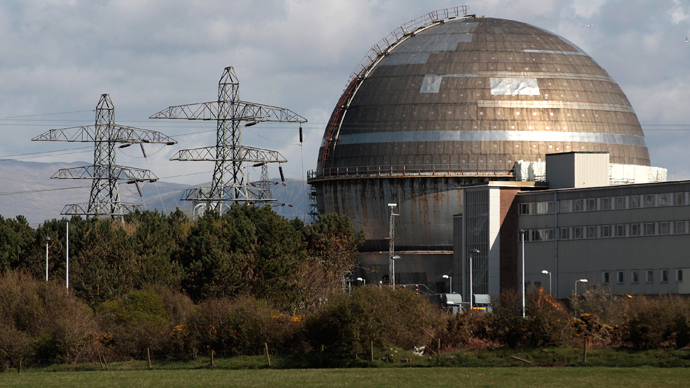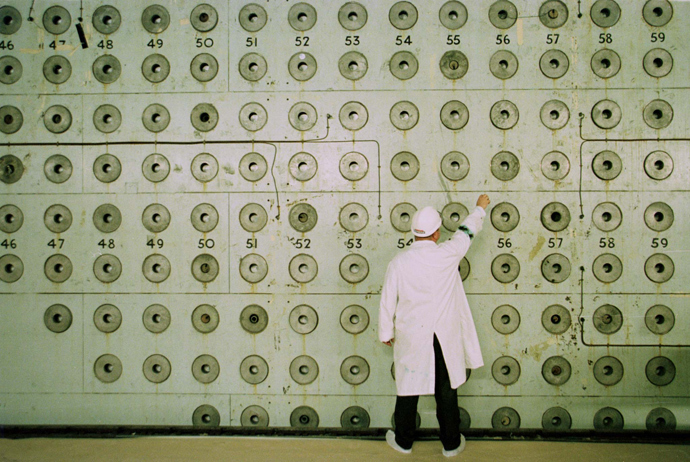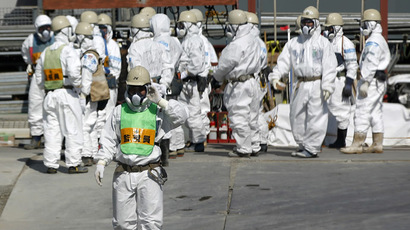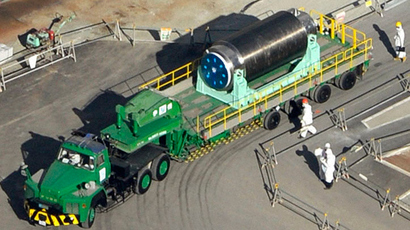Burning UK plutonium stockpiles now considered ‘credible’ option – report

The incineration of Britain’s vast plutonium stockpiles is now being considered a “credible” option by the Nuclear Decommissioning Authority, according to a long-awaited secret report. Three ways of disposing of the plutonium are being considered.
Highly radioactive plutonium stockpiles, which have been piling up and plaguing British governments for the past three decades, have passed the 100-ton mark and will likely have increased to as much as 140 tons by 2020. This figure is supplemented by a decision to include foreign plutonium from imported nuclear waste in the statistics.
Ongoing delays have hindered attempts to make any final decision on what to do with a substance that has been a recurring burden on the country. The excess costs some £2 billion ($3.3 billion) a year to maintain at the Sellafield nuclear plant in northwest England, where all storage of radioactive materials and nuclear reprocessing in the UK takes place.
As well as being a health hazard, the plutonium has also been cited as a potential target for terrorist attacks.
While initially, the decommissioning authority only had one “credible option” – burning mixed oxide fuel (Mox fuel) in conventional nuclear reactors, new ideas were put forward after the failure of the £1.4 billion ($2.3 billion) Mox plant at Sellafield, the closure of which was forced in 2011.
Two other options being mulled were the usage of a Canadian nuclear power plant called a Candu reactor, which would burn the Mox fuel. The third option, considered more drastic, is the full-on burning of plutonium in a fast reactor built by GE-Hitachi.

The authority’s report on credible options, seen by the UK’s Independent newspaper, has been in the pipeline for months, and ministers have been “sitting” on it, the paper reported.
The NDA announced at the end of August that they had
“shared” their findings with the Department for Energy and
Climate Change (DECC). The DECC were still “currently
considering [the report’s] conclusions” at the end of
August. It had suffered several delays before being
submitted, and the governmental response – which should have been
provided within weeks of the submission – was then delayed until
next year.
In August, the NDA stated openly that they had “engaged GE-Hitachi and Candu to provide further information regarding their PRISM and Enhanced CANDU 6 (EC6) reactor proposals respectively.”
As early as March 2012, the NDA had received four responses,
after announcing that they had been seeking proposals on
“alternative approaches” for the management of UK
plutonium stocks, adding that there was “merit” in
progressing two alternative proposals and requesting that General
Electric-Hitachi (GEH) and Candu provide further information.
However, the NDA at that point noted that “the technology
proposed is not currently included in the NDA credible
options.” Adrian Simper, the NDA’s strategy and technology
director, stated in April this year: “We have some market
tension going.”
Industry insiders reported to the paper that intense negotiations
may have been affected by the strike price for electricity
generated by Hinkley Point C in Somerset, southwest England,
which was only concluded Oct. 21.
“Credibility,” according to the NDA, is assessed by
determining options “which could potentially be accomplished
safely, while complying with the law, and using technologies
and/or methodologies which are either available or capable of
being developed within the foreseeable future, and which allow
decisions to be made on a timescale commensurate with any
strategic imperatives.”
The final contract will likely only be finalized in 2015, according to The Independent.
DECC is expected to seek the views of the National Security Council, chaired by UK Prime Minster David Cameron, before it publicly releases its position statement on the future of Britain’s cumbersome plutonium stockpile .














